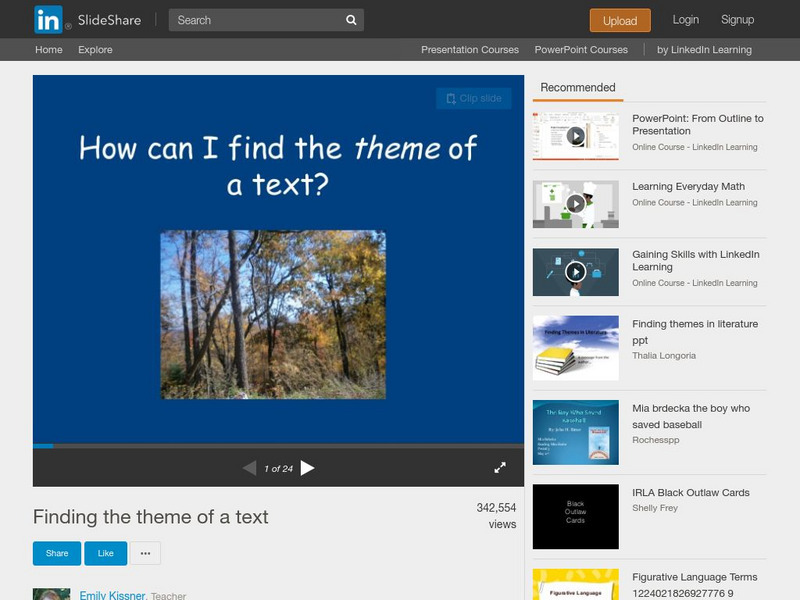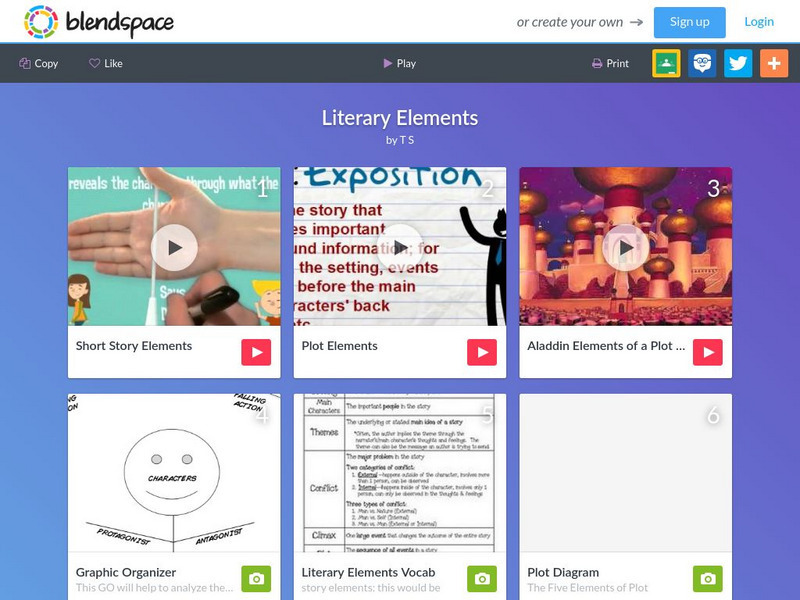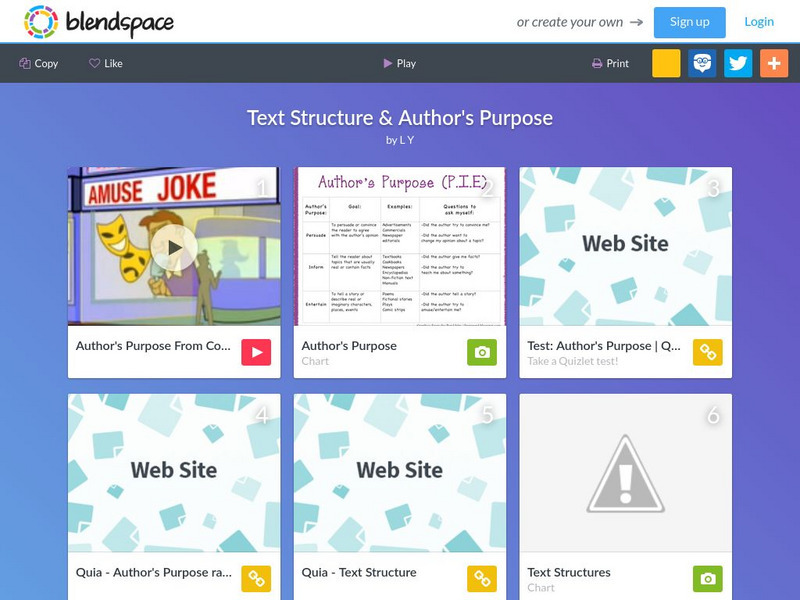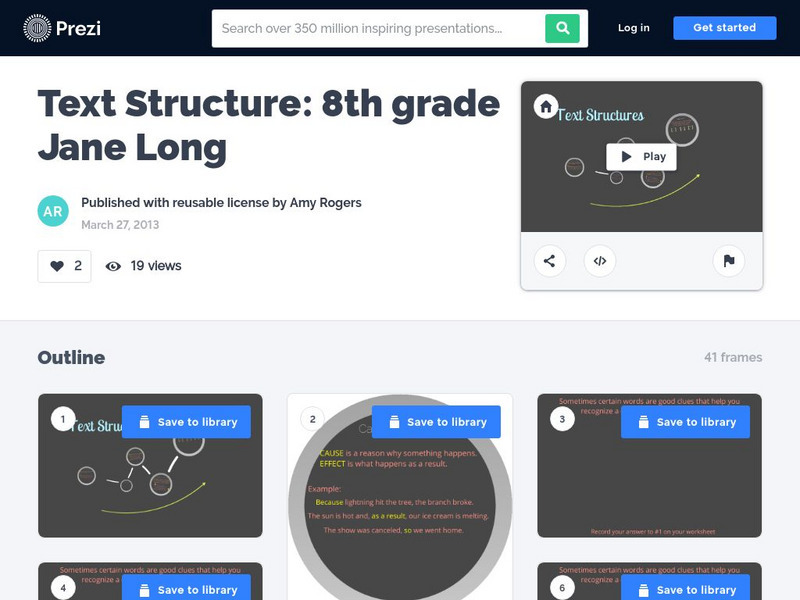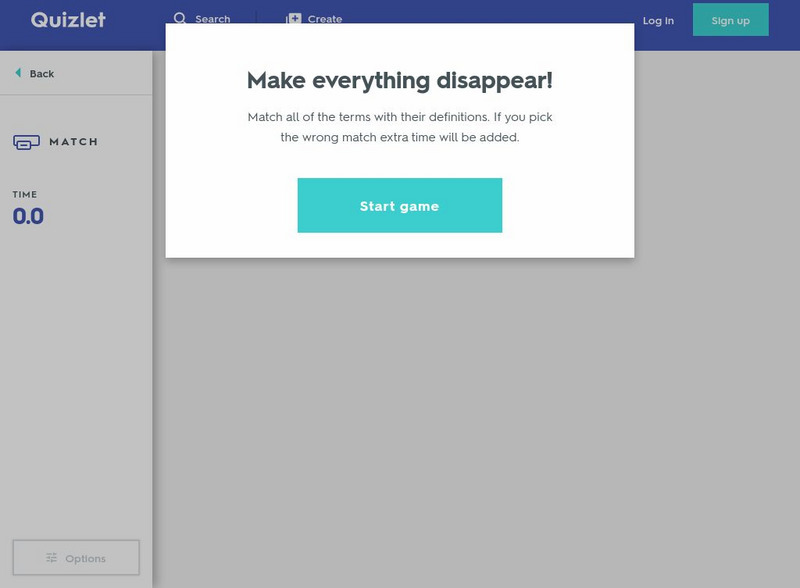AdLit
Ad lit.org: Classroom Strategies: Summarizing
Summarizing teaches students how to take a large selection of text and reduce it to the main points for a more concise understanding. Upon reading a passage, summarizing helps students learn to determine essential ideas and consolidate...
Houghton Mifflin Harcourt
Holt, Rinehart and Winston: Theme: The Story's Meaning and Roots [Pdf]
A PDF worksheet that provides five important questions to help you analyze theme. RL.9-10.2 and 11-12 Analyzing Theme.
Tom Richey
Slide Share: How Can I Find the Theme of a Text?
Twenty-four slides explaining what a theme is and how it can be identified in a text.
TES Global
Blendspace: Text Structures
A thirty-part learning module on text structures including description, sequence, problem and solution, compare and contrast, and cause and effect. Lessons include links to pictures, story text, informational text, videos, charts,...
TES Global
Blendspace: Interpreting Literature Terms
A fourteen-part learning module on literary terms including links to text, videos, word lists and images on literary terms such as plot, setting, character, point of view, style, theme, and more.
TES Global
Blendspace: Expository Writing
A twelve-part learning module with links to images, texts, slides, a video, and a quiz about expository writing, text structures, conjunctive adverbs, and more.
TES Global
Blendspace: Literary Elements
A six-part learning module with links to videos and graphic organizers on plot and plot elements.
TES Global
Blendspace: Text Structure & Author's Purpose
A ten-part learning module with links to videos, images, and websites to use while learning about text structure and author's purpose.
TES Global
Blendspace: What Is the Main Idea and Supporting Details?
A learning module with thirty links to texts, slide shows, videos, and images that teach about finding the main idea and supporting details in a written passage.
Other
Prezi: Nonfiction Text Structures
Slideshow examines the five most common text structures used by authors to organize nonfiction writing.
Other
Prezi: Implied and Stated Main Idea
Slideshow explains the difference between implied and stated main ideas and provides practice with finding the main idea.
Other
Prezi: Text Structure
Slideshow explores text structure and delves into cause and effect, compare/contrast, description, problem/solution, and more.
ClassFlow
Class Flow: Story Elements
[Free Registration/Login Required] This flipchart defines the elements of a story: character, setting, theme, and conflict.
ClassFlow
Class Flow: Topic & Main Idea
[Free Registration/Login Required] Recognizing the main idea is the key to good comprehension. The main idea is a general idea under which fits all the supporting material of the passage or paragraph. Learn and use three strategies that...
Tom Richey
Slide Share: Distinguishing Main Ideas and Supporting Details
This downloadable slideshow focuses on main ideas and supporting details including definitions, identification, and practicing with paragraphs. RI.9-10.2 central idea/summary
ProProfs
Pro Profs: Main Idea
This is an eight-question multiple choice quiz over the main idea. It offers links to other quizzes and a test on the same topic.
ProProfs
Pro Profs: Main Idea
This is a ten-question multiple choice quiz over the main idea; students read paragraphs and select the main idea.
Can Teach
Can Teach: Introduction to Character Traits
In this lesson plan learners will better understand what and how to generate the traits of a character. Lesson plan indicated for 4th grade and above.
ClassFlow
Class Flow: Graphic Organizer Spider Graphic
[Free Registration/Login Required] This graphic organizer provides a webbing framework for students to analyze the main idea/theme and supporting details of a reading passage or historical event. A template for students to follow is given.
Houghton Mifflin Harcourt
Holt, Rinehart and Winston: Analyzing a Story's Theme [Pdf]
A short set of questions designed to help students consider and analyze the element of theme within a piece of literature. RL.9-10.2 and RL. 11-12.2 Analyzing Theme.
Other
Mantex: Tutorials: What Is Close Reading?
This site discusses the four types of reading: Linguistic, Semantic, Structural, and Cultural and offers a detailed example of close reading. RL.11-12.3 Auth choice story elem, RL.11-12.5 Choice of Text Structure
Quia
Quia: Reading: Finding the Main Idea
Students read forty short texts and choose the main idea of each text. Correct answers are provided for any missed, and the score is tallied along the way.
Quizlet
Quizlet: Making Inferences (Nonfiction)
Match five words and definitions about making inferences in nonfiction texts by racing against the clock in this learning game.
Quizlet
Quizlet: Making Inferences (Nonfiction)
Build your nonfiction inference vocabulary by interacting with terms like lesson, data, schema, sources, and more. Choose to view flashcards, complete learning and spelling exercises, take a test, or play a matching or gravity game.



![Holt, Rinehart and Winston: Theme: The Story's Meaning and Roots [Pdf] Activity Holt, Rinehart and Winston: Theme: The Story's Meaning and Roots [Pdf] Activity](https://d15y2dacu3jp90.cloudfront.net/images/attachment_defaults/resource/large/FPO-knovation.png)
